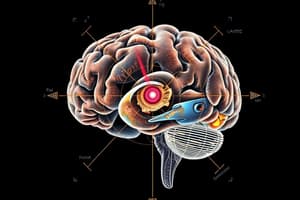Podcast
Questions and Answers
According to Spearman's theory of intelligence, specific abilities (s factors) are:
According to Spearman's theory of intelligence, specific abilities (s factors) are:
- Independent of general intelligence (g)
- Equal to general intelligence (g)
- Not constrained by general intelligence (g)
- Constrained by general intelligence (g) (correct)
The g factor in intelligence refers to:
The g factor in intelligence refers to:
- Emotional intelligence
- Physical strength and agility
- Specific, task-specific abilities
- General intelligence underlying all cognitive abilities (correct)
When examining types of intelligence tests, which factor is specifically related to a narrow set of skills or tasks?
When examining types of intelligence tests, which factor is specifically related to a narrow set of skills or tasks?
- General intelligence (g)
- Fluid intelligence
- Crystallized intelligence
- Specific abilities (s factors) (correct)
In Spearman's theory of intelligence, which factor encompasses a broad spectrum of cognitive abilities?
In Spearman's theory of intelligence, which factor encompasses a broad spectrum of cognitive abilities?
Specific factors in intelligence, according to Spearman's theory, are characterized by their:
Specific factors in intelligence, according to Spearman's theory, are characterized by their:
Flashcards
Specific abilities (s factors)
Specific abilities (s factors)
Specific skills or abilities in intelligence, limited by general intelligence.
General intelligence (g)
General intelligence (g)
Broad intelligence, encompassing various cognitive skills.
Intelligence tests - specific abilities
Intelligence tests - specific abilities
Tests focussed on a narrow set of cognitive skills or tasks.
Spearman's g factor
Spearman's g factor
Signup and view all the flashcards
s-factor independence
s-factor independence
Signup and view all the flashcards
Study Notes
Spearman's Theory of Intelligence
- Spearman argued that cognitive test performance relies more heavily on general intelligence.
g Factor and s Factors
- The g factor represents general intelligence, accounting for similarities in cognitive test performance.
- The s factors (specific factors) represent differences in specific abilities.
- s factors are influenced by training, practice, and other environmental factors independent of general intelligence.
- Specific abilities (s factors) draw upon and are constrained by general intelligence (g).
Studying That Suits You
Use AI to generate personalized quizzes and flashcards to suit your learning preferences.




